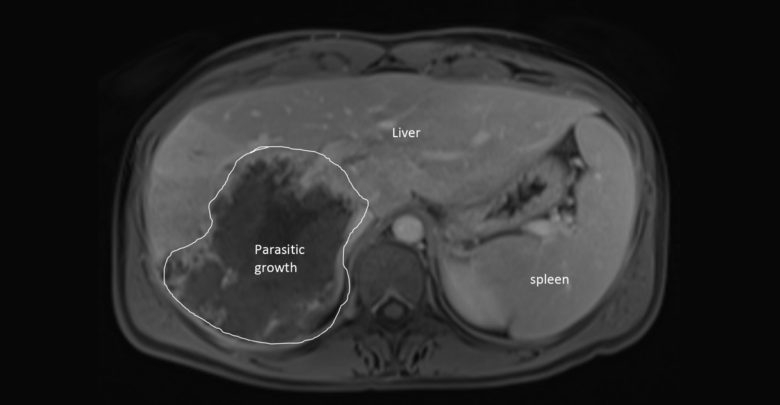 Supplied by Stan Houston
Supplied by Stan Houston While public health concerns have centred on the coronavirus lately, the spread of a rare parasite has been on the rise in a local capacity.
The parasite, known as Echinococcus multilocularis, takes the form of a tapeworm and is hosted in coyotes and rodents. While it doesn’t affect the coyote, in rodents the parasite cells grow and multiply in the liver, behaving like a cancer. Occasionally, humans also become accidental hosts but can incubate without symptoms for a period of up to 15 years. As it expands it can be extremely painful and difficult to remove.
The rare liver parasite infection has had a smattering of cases across Canada with the vast majority occurring in Alberta — one in Montreal, one in Toronto, but 15 cases in Alberta within the last 7 years.
“Presumably, somebody brought a poodle over from France or an Alsatian dog over from Germany that was carrying the parasite,” said Stan Houston, a professor in infectious disease in the School of Public Health at the University of Alberta. “One of the things that’s most remarkable to me is that it seems to have very successfully established itself in the wild cycle.”
“If you find the parasite at a time when its technically feasible to remove it surgically, that’s the treatment of choice,” Houston said. “It’s a pretty big operation because it’s taking a big chunk of your liver, but sometimes the disease is too extensive and in that case the patient has to take an anti-parasitic drug which unfortunately is not potent enough to kill the parasite, only affective enough to stop it from growing. So that’s potentially an indefinite treatment.”
Hypotheses of how one could get the parasite involves eating produce from a garden where coyotes or infected dogs are defecating, in addition to petting a dog which has tapeworm ova on its fur.
In terms of prevention, Houston posits the best routes currently known are washing produce, and washing hands. Deworming your dog, while a good idea in selective cases, can be an expensive, and not always affective route.
“People who are immune-suppressed are most at risk,” Houston said. “For example, patients who have had an organ transplant are at increased risk of this disease being active and progressing fast, and there are more of those people in our society than there used to be.”
Above all else, Houston encourages reasonable awareness in proportion with the infrequency of these cases.
“It’s important to strive to get a bit of a balance between recognizing that this is something new, and that we should pay attention to it and learn more about it,” Houston said. “But on the other hand it is a rare disease, and it will still not likely be a common disease, so we can keep that in perspective.”




